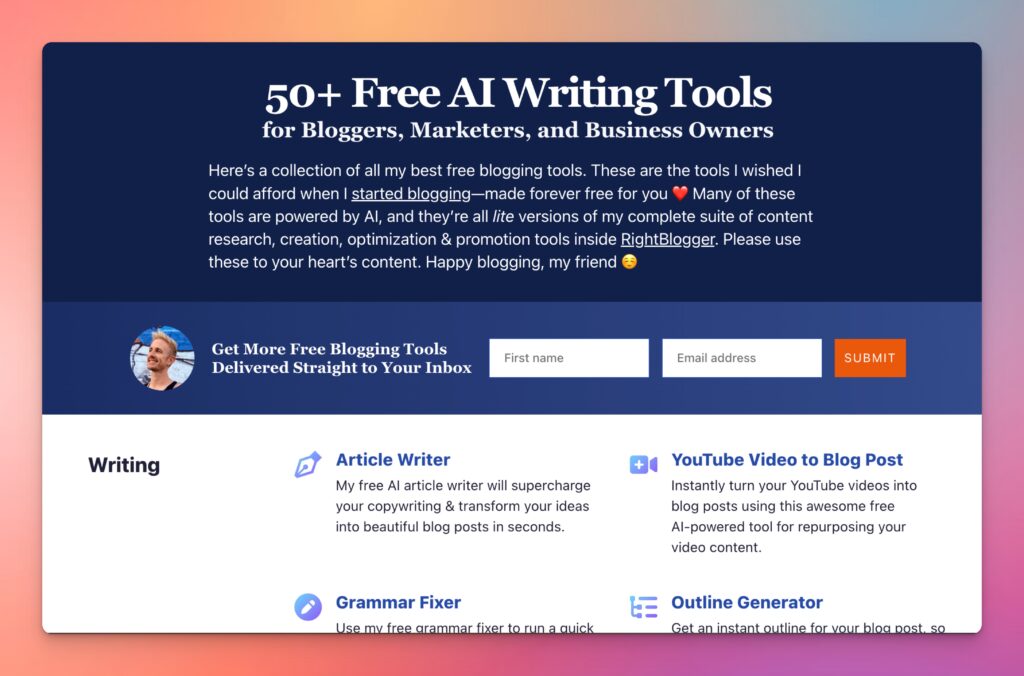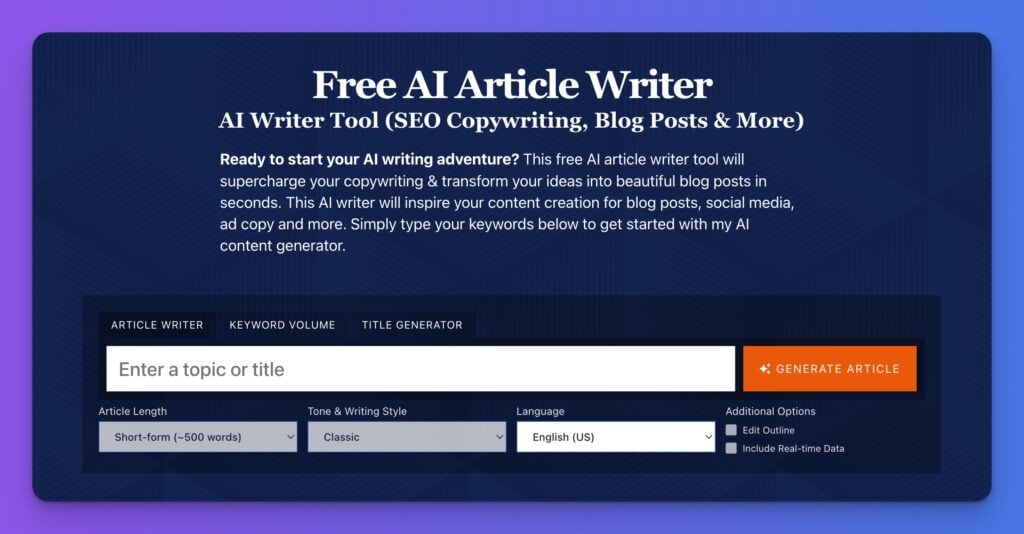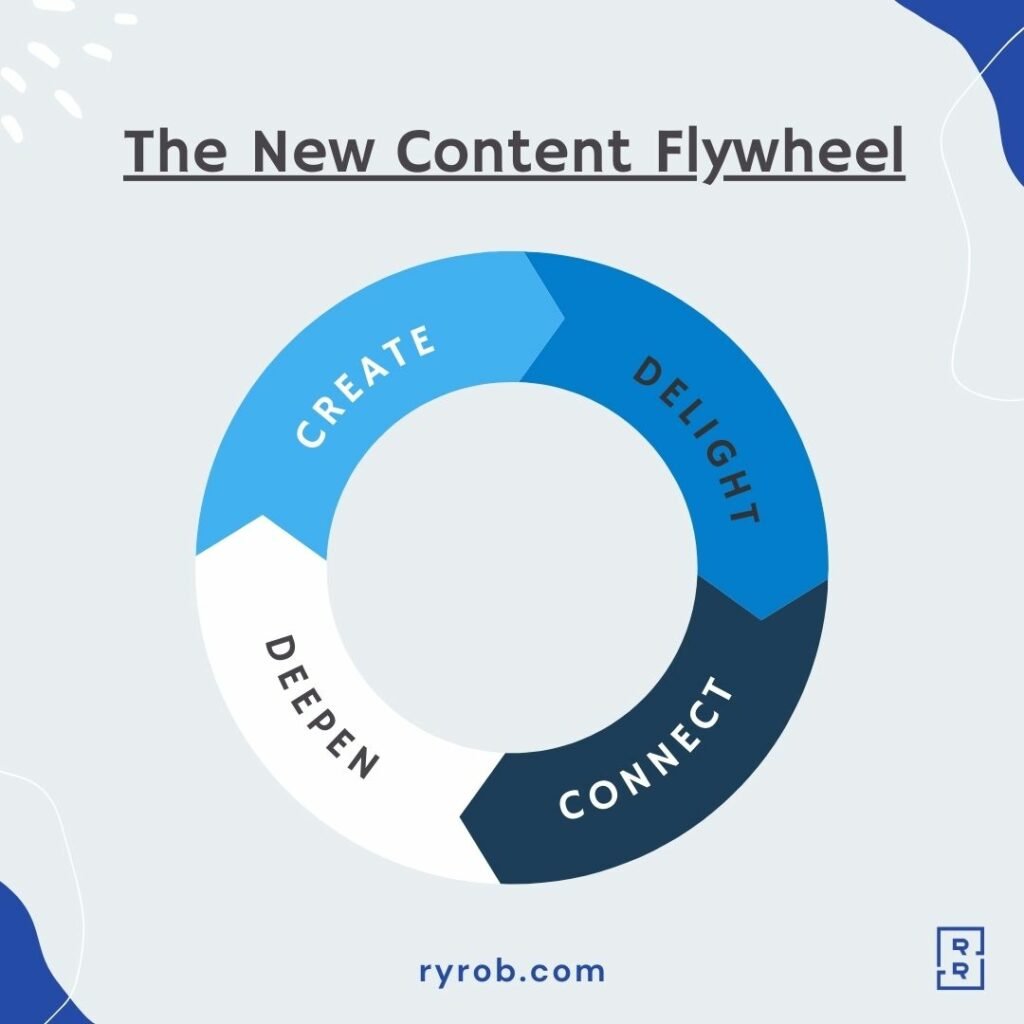Ah, SEO. The buzzword that strikes fear (or joy) into the hearts of millions each year. Well, is SEO dead, finally? No, but there’s a lot more nuance to this one.
For well over a decade, SEO was like the early days of the gold rush for bloggers, startups, and creators of all types. Without much knowledge or experience, you could pretty quickly get the hang of this whole rank my content high in Google search results thing. Times have-a-changed, my friend.
🔑 Is SEO dead in 2025? No, but the old way of SEO that attempts to game Google's search algorithm is dying faster than ever. The best long-term SEO strategy, producing high quality content that genuinely helps people, is more successful than ever.
SEO has gotta be one of the greatest love-hate relationships of the 21st century in Internet-land. And here we are in 2025, navigating increasingly dramatic updates to Google’s search engine algorithm, seeing the proliferation of generative AI, and even the presence of AI in search results via Google’s Search Generative Experience (SGE) amongst others, answering some queries on the fly:

For the past 12 years, I’ve been running this blog. I get anywhere from 200,000 to 600,000 monthly readers, almost entirely from organic search (SEO is my jam). I’ve been hired by dozens of the world’s top startups and Fortune 500 brands, to plan, implement, and recover organic traffic growth initiatives. So, I keep my finger close to the pulse on SEO.
It’s time to grab your favorite snack and buckle up, because we’re diving deep into the nuance of this complex topic. And let me tell you, while SEO is still very much alive and thriving—it requires a shift away from the “old ways” of doing things.
Now, let’s explore all the ways SEO is changing today and how you can position yourself for long-term success as a creator.
Use My 50+ Powerful Free Blogging Tools Today

When I first started blogging, I couldn’t afford fancy tools. That sucked. And that’s why I’ve built a stable of powerful free blogging tools ranging from keyword research to an AI article writer, blog idea generator and more. Forever free for all to use—no strings attached.
Old SEO vs New SEO (in 2025)
Remember the good old days when keyword stuffing was the holy grail, and Google’s algorithm was seemingly easy to manipulate? Those days are long gone, despite the anecdotal examples to the contrary that’ll always exist (usually on extremely high authority sites that’ve been around for a long time).
Things like high quality backlinks still matter in boosting the authority of your website as a whole (and on an individual post/page level), but much of what “worked” in the past decade, is shifting in a big way. Here’s a checklist of how to think about old SEO vs new SEO:

Here’s what matters most when it comes to generating more organic traffic from search engines like Google today:
- Value-centric content (that genuinely serves and impacts readers)
- Content that’s written for humans first, and lightly optimized for SEO
- Meeting user-intent, expectations and delivering on your promise
- Clear, helpful headlines that aren’t over-optimized for keywords
- Expressive meta titles and meta descriptions that don’t overdo it
- Skimmable headings and sections that help readers navigate easily
- Formatted for readability with lists, header sections, and images
- Natural keyword use where applicable (instead of keyword stuffing)
- Internal and external links to help readers go deeper
- Websites that are mobile-first optimized and load quickly for users
The only bonus I’ll add to this list, is a reminder that while Google Search higher-ups like John Mueller frequently state that backlinks don’t matter as much in SEO these days, my experience has shown me that’s not necessarily the case.
There are a whole lot of benefits I still experience from naturally getting high quality links from other authoritative websites through activities like guest blogging and being a guest on podcasts. Low quality links, on the other hand, can do more damage than good.
Here’s the deal—SEO is far from being dead. What SEO is and how we do it in the age of AI, is transforming rapidly today.
The Foundation of New SEO: Genuine Content & Connection
At a time when even my own free AI article writer can churn out a pretty great first draft blog post in just a few seconds, the real challenge is learning how to create content that actually connects and resonates with real humans.

We’ve long been in a race to the top, but the stakes are getting higher. Average content is falling by the wayside faster than ever—and being replaced by blog posts, podcast episodes, and videos that actually make people feel seen, heard, and understood.
The goals of content creation are no longer as easily tied to conversion as they once were.
Instead of expecting a blog post or landing page to immediately convert someone new to your blog, brand, or show—into an excited customer on that first interaction, aim for these objectives:
- Awareness: Content is and always will be useful for attracting a new audience & reminding them you’re here. It’s a numbers game, so you have to show up with value for your audience, often. That’s why it pays dividends to create in a niche you truly love.
- Affinity: Making your audience feel seen, heard, and understood creates a powerful sense of closeness. Do this well, repeatedly over time, and you won’t have an audience, you’ll have fans that eagerly anticipate what’s coming next from you. Companion content is a great way to plant the seeds for blossoming these relationships today.
- Education & Entertainment: Invest deeply into creating content that teaches (and captivates) your audience about everything they need to know within your subject matter. This is where a video-first content creation process really shines through. Platforms like YouTube, Instagram & TikTok are great for both discoverability and relationship building with your audience—these are some of the best places to spend your creation time today. Then you can use tools like my free video to blog AI generator that instantly turns your videos into actionable, SEO-friendly blog content to pick up organic Google traffic too.
We’ve all felt how a 100% AI-written article feels. When a creator publishes an AI-generated article without personalizing it and weaving in their own genuine take, it feels to the reader like they’re being served microwave meals at a gourmet restaurant. You might be full, but where’s the love? The flavor? The spark that turns a meal—errrrr content—into a true experience?
The new SEO is cultivating your ability to create experiences that move readers, and still nail the basic fundamentals of on-page SEO that’ll set your content up for long-term success. Let’s run through a few of the ways you can strike this balance today.
1. Building in a Personal Touch

So, how do you really win at SEO in 2025? Well, there’s no ignoring that AI writing tools are changing the ways we create content. So, rather than resisting it, view them not as an enemy, but as an assistant in the creation process. A new AI blogging process can speed up your workflow, but the secret sauce—my friend, is and always will be you.
Your own lived (human) experiences, learnings, stories, insights, and unique voice are irreplaceable. This is what breathes life into your content, and leads to people spending more time with your creations. This, in turn, makes search engines like Google and YouTube notice that your content is more engaging than others in your space.
This is the new content flywheel that creators are using to build meaningful relationships with people, today:

The new content flywheel is this continual loop:
- Create: Creating personal, value-centric content that genuinely solves real problems for your audience.
- Delight: Finding your balance of education & entertainment that puts a smile on people’s faces.
- Connect: Making your readers, listeners, viewers feel seen, heard, and understood builds connection.
- Deepen: Go deeper by listening to your audience and creating custom content for your people.
Like it or not, the truth is that content has become a commodity today. Our social feeds are flooded with creators trying to reach new audiences and capture attention—and the best way to stand out, is by embracing your weird. Lean into expressing your personality, be goofy if that’s who you are, share openly from your heart and you only stand you gain.
The new content flywheel starts with being unapologetically you. Share your stories, sprinkle in your quirks, and let yourself shine.
2. Using Generative AI Tools to Your Advantage
I’ll forever be an advocate keeping yourself front & center in your content creation process.
However, dismissing the incredible advantages of AI tools is a little like refusing to use your GPS when you’re lost in the woods, just because you’re nostalgic for paper maps. Nostalgia is great, but I’d rather get to where I’m going than spend hours lost in the wilderness.
AI can help you be more efficient, cutting down the time investment on tasks that don’t bring you as much joy—so you can focus on what matters most—injecting your insights, expertise, heart, and soul into the content you create.
Here are some of the best use cases for AI tools in our modern content creation process:
- Generating Ideas: Tools like my free blog post idea generator thrive at coming up with a never-ending stream of research-backed topics where real audiences are actively searching for answers, help, education, and entertainment.
- Keyword Research: My free keyword research tool is great for validating whether or not a topic has enough of an audience to justify spending hours of time creating content on the subject.
- Outlines & First Drafts: Generating blog post outlines and writing first drafts using tools like my free AI article writer are amazing use cases for speeding up your creation process, allowing you to create more great content, faster. Just be sure to invest time, effort, energy, and love into your editing process, to make sure your content connects with real people. Here’s more on my AI writing process.
- Repurposing Content: This is one of my favorite use cases for AI today. Tools like my video to blog post generator will take any video you’ve created, and within seconds, write an SEO-optimized blog post draft that you can publish and reach a wider audience that prefers to consume content in written format.
Inside RightBlogger, we’ve built tons of AI-powered tools for creators to better research, plan, create, and promote content. These are the tools I wished I had when I was first beginning to blog.
Use My 50+ Powerful Free Blogging Tools Today

When I first started blogging, I couldn’t afford fancy tools. That sucked. And that’s why I’ve built a stable of powerful free blogging tools ranging from keyword research to an AI article writer, blog idea generator and more. Forever free for all to use—no strings attached.
3. Nailing Your On-Page and Off-Page SEO Basics
All of this beautiful (true) sentiment aside, here’s where things gets real—the basics of SEO still matter.

The nitty-gritty stuff very much has a place in content creation. I have some extremely in-depth guides on an overview of SEO for bloggers, and a detailed breakdown of on-page SEO fundamentals worth checking out. These deets include things like:
- Doing keyword research to make sure you’re covering the right topics (keyword clustering is smart too).
- Using proper heading structures to help readers and search engines navigate your content.
- Weaving in your target keyword phrases (without keyword stuffing) to show search engines what your content should be ranked for.
- Nailing your meta details (titles, descriptions, permalinks) and making sure they’re working in your favor for high organic rankings.
- Remembering to use descriptive, SEO-friendly image alt text for any graphics you include in your content.
Then there’s also what’s called off-page SEO. This is where things like backlinks, guest blogging, social signals, and the power of networking with other creators who are game to share your content with their audiences, comes into play.
SEO isn’t a “set it and forget it” kinda thing. If you want sustained (free) traffic from search engines like Google, it requires nailing all of these fundamentals, constant monitoring for fluctuations, and the willingness to pivot your content when necessary.
Keep an eye on your analytics, watch how your content performs, and don’t be afraid to tweak things. Flexibility is the name of this game.
So, is SEO Dead in 2025? No, it’s Different (and Very Much Alive)
So, is SEO dead? Far from it. However, SEO has evolved into a more sophisticated, highly nuanced, and less technical game than it once was. The foundation of SEO now craves genuine, heart-felt content first, with a smaller dose of the technical bits thrown in.

And while the proliferation of AI tools will no doubt continue to change the ways we create content over time, don’t lose sight of the real reason we’re drawn to learn from other people (creators like you)… for the genuine human connection we feel along the way.
So, remember why you’re here—to connect, share, educate, entertain, and make your corner of the Internet uniquely yours.

Ryan, thanks for writing this post. I have some blog posts from my travel blog that were ranking OK, not great (like 30s-40s) that were *purely* human written, but which have dropped to the 90s or even out of the top 100. I think the content is high quality and it’s all based on personal experience rather than what GPT thinks. Why do you think my rankings have dropped so much? You’ve been such an invaluable resource since starting my blogging journey and I’d appreciate any insight! <3
SEO isn’t dead in 2024; it’s evolving. With search algorithms becoming more sophisticated and user-centric, traditional SEO tactics are giving way to a more holistic approach focused on providing valuable content and enhancing user experience. Adaptation is key to staying ahead in this dynamic landscape
SEO (Search Engine Optimization) isn’t dead in 2024; it’s just evolved. As search engines continue to refine their algorithms and users’ search behaviors change, SEO strategies have adapted accordingly. While some traditional SEO tactics may have become less effective or outdated, the essence of SEO—optimizing your content to be found and favored by search engines—remains crucial for online visibility.
In 2024, SEO emphasizes user experience, quality content, and relevance more than ever. Search engines prioritize websites that provide valuable, authoritative, and user-friendly content. This means focusing on creating content that genuinely addresses users’ needs, optimizing for mobile devices, improving site speed, and enhancing overall user experience.
This article offers a clear and encouraging perspective on the evolving world of SEO. Thanks for breaking down these changes and providing actionable insights for navigating them!
I love how this blog breaks down the trends and offers practical tips for keeping SEO strategies fresh and effective
SEO is far from dead in 2025; it’s evolving, and staying ahead of the curve is key to success.
great post , thank you for sharing.
very good information sir and improve my knowledge thanks a lot
SEO is definitely evolving, not dying! Loved the insights on adapting to algorithm changes and focusing on quality content. With AI and voice search gaining traction, how do you see SEO strategies shifting in the next few years?
Very interesting, I like this!
Great article! SEO isn’t dead; it’s just evolving. Adapting to new trends is key to staying relevant. Thanks for the valuable insights!
Hi Ryan,
Fantastic article! I really appreciate the insights on how SEO is evolving in 2025.
Your breakdown of old SEO vs. new SEO is especially helpful.
I was wondering—how do you see AI-generated content impacting search rankings in the long run?
Will human-written content always have the upper hand?
Thanks for sharing such valuable knowledge!”